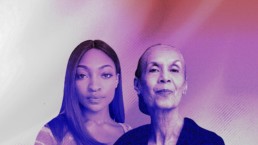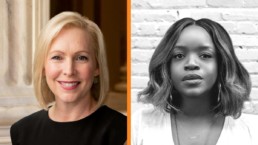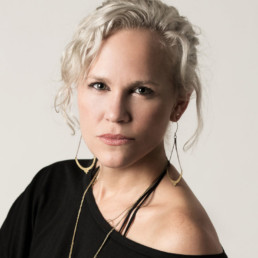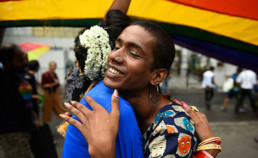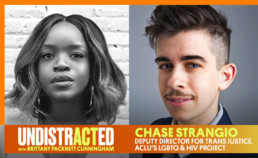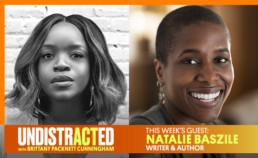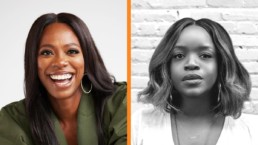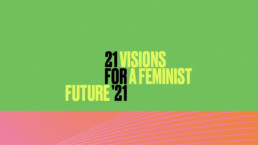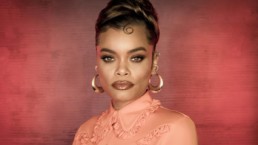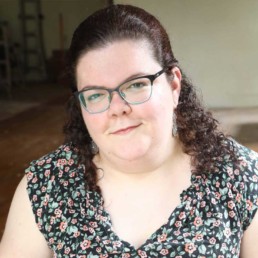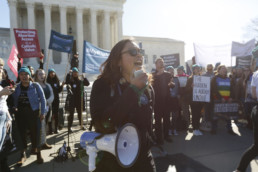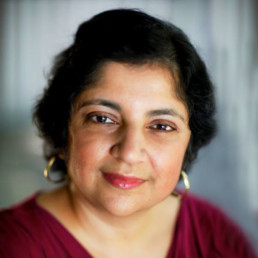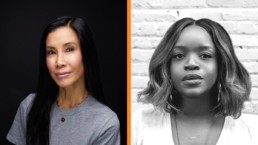Tomorrow! Join Drew Dixon, Jasmine Mans, and more for a powerful evening
NEWSLETTER
There’s still time to sign up! Please join us on July 8, 2021, at 7 pm ET, for a preview of The Meteor’s brand-new audio program, In Love and Struggle: A Black Woman Grows in America.
Hosted by author and podcaster extraordinaire Brittany Luse, the evening will feature many of the voices behind this year’s Audible Original, including:
- Cultural critic Rebecca Carroll in conversation with music producer and assault survivor Drew Dixon
- Kamilah Forbes, executive producer of the World Famous Apollo Theater in Harlem, in conversation with activist/student Treasure Brooks
- Poet Jasmine Mans sharing new original work
- With special appearances from writer/playwright Pearl Cleage, teen advocate Ve’ondre Mitchell, playwright Lynn Nottage, audio journalist CC Paschal, and more
This free virtual event is open to everyone.
Learn more about In Love and Struggle—and watch clips from last year’s show.
These days the news is filled with Republicans ranting about the dangers of Critical Race Theory (CRT). And multiple states have introduced legislation to ban its teaching—as well as topics of racism—in schools.
What is CRT and why are state legislatures so focused on doing away with it? This week on UNDISTRACTED, Brittany Packnett Cunningham sat down with the legal scholar who helped pioneer CRT, Professor Kimberlé Crenshaw, to find out.
You won’t want to miss their conversation—featuring an entire primer on the issue. “Our side wants to tell the truth to set us free,” Crenshaw says. “The other side wants to bury the truth to sustain their access to power and dominance over the rest of us.”
Co-founder of the African American Policy Forum, Professor Crenshaw is on the faculty at UCLA Law and Columbia Law School. In addition to her groundbreaking work on CRT, she also coined the term “intersectionality” over 30 years ago—making her, as Packnett Cunningham explains, “the godmother” of UNDISTRACTED, our intersectional feminist podcast.
Listen on Apple Podcasts, Spotify, Stitcher or wherever you get your podcasts.
Senator Kirsten Gillibrand on the bill she’s worked 10 years to pass
NEWSLETTER
The military’s failure to address sexual assault is an ongoing and widely recognized problem: Of the estimated 20,000 sexual assaults against service members in 2018 (the most recent numbers from the Department of Defense), only about 200 ended in conviction. And the problem has actually gotten worse, with rates of prosecution and conviction going down over the last few years.
Why is it so hard to do right by military survivors? And how can we make the armed forces do better? Brittany Packnett Cunningham sat down with Senator Kirsten Gillibrand this week on UNDISTRACTED to talk about the New York Democrat’s 10-year campaign to ensure more accountability for military sexual assault—and why justice may finally be on the horizon. (Trigger warning: This episode discusses sexual assault.)
A candidate in the 2020 Democratic presidential primary, Senator Gillibrand has represented New York since 2009. And after years of pushing her colleagues on the issue, she now has bipartisan support for the Military Justice Improvement and Increasing Prevention Act, which aims, among other reforms, to move sexual assault cases out of the military’s “chain of command” and over to independent prosecutors.
Packnett Cunningham and Gillibrand dug into why the military’s prosecution of sexual assault cases has worsened, what needs to change, and, of course, whether the senator will run for president again. Highlights of their conversation:
Sen. Gillibrand on what needs to change: “We have done a terrible job in actually prosecuting these cases. The percentage of cases moving towards prosecution is going down. The percentage of cases that are ending in conviction is going down. And so under no measurable is the military getting this right. And so we’ve been asking to take the decision making of whether to prosecute these crimes out of the chain of command and give it to trained military prosecutors who are unbiased and professionalized.”
Sen. Gillibrand on how the current system is biased: “We know there’s bias in which cases go forward on sexual assault. And we know there’s bias in prosecution and punishment of Black and brown service members. They’re up to 2.6 times [more likely] to be punished than a white service member. So you need this reform for both plaintiffs’ rights and defendants’ rights—to fix the bias in sexual assault cases and fix the bias against Black and brown service members.”
Sen. Gillibrand on the urgent need for justice: “When I sit down with service members who have been brutally raped and then denied justice by either being disbelieved or being directly retaliated against, it truly breaks my heart because these are men and women who will die for this country…And justice is absolutely something that’s part of our Constitution, our democracy, and something we believe in. And for them to be denied justice, I think, is an outrage.”
Sen. Gillibrand on her political future: “Well, I certainly hope I get the chance to run for president again someday. I loved it. I had such a wonderful and powerful and inspiring opportunity to learn from people all across the country to develop a different set of skills—and greater strengths.”
Listen on Apple Podcasts, Spotify, Stitcher or wherever you get your podcasts.
WHAT OUR COLLECTIVE IS INTO RIGHT NOW
The Meteor is guided by our collective; here’s what founding member and producer Ginny Suss is up to this week.
I’M WATCHING RESIST, the new documentary about the Resistance Revival Chorus [of which Suss is a co-founder] that just debuted at the Tribeca Film Festival. It explores how our chorus came together, and various other choruses that have popped up around the country following our toolkit. The way these women come together and raise their voices in the spirit of protest is inspiring.
Also, Pose, the final season. This show is giving me life. It’s not only shining a light on trans issues, uplifting Black joy, and feeding us some serious dance moves, it’s also revisiting ACT UP’s incredible AIDS activism and art of the 80s and 90s.
I’M LISTENING TO This Joy! The Resistance Revival Chorus’s album is out now on all streaming platforms. Plus, get your limited-edition RED vinyl.
I’M READING The Overstory, by Richard Powers. It’s by far one of the best novels I’ve read in the past 10 years.
I’M FOLLOWING adrienne maree brown. Her writing is transformative, including her ideas about Pleasure Activism, and her study of Octavia Butler’s works is genius.
I’M DOING LESS Sleeping.
I’M GETTING MY JOY FROM Music, friends, sunshine, and water.
Ginny Suss is a producer, content creator, documentary photographer and founder of Ginny Suss Productions. She is also a founder of the Women’s March, OkayAfrica, and the Resistance Revival Chorus.
Your Pride read, watch, and listen list
NEWSLETTER
Consider this your Pride reading and viewing list: We’ve got recommendations for your summer downtime from The Meteor Fund’s 21 For ’21 Syllabus, featuring works that center the LGBTQ+ community’s past—and future. (If you’ve never read June Jordan, now’s the time.)
Plus, keep reading to hear from the ACLU’s Chase Strangio (one of the lawyers behind last year’s major Supreme Court victory on LGBTQ+ workplace rights) about the new wave of anti-trans legislation—and why “queer survival” should matter as much as “queer magic.” He’s the guest on this week’s UNDISTRACTED, and it’s a good one.
First, that reading and viewing list. We asked some of the most interesting people we know for works that help point the way toward a more feminist future. (Download the full Syllabus at The Meteor Fund.) Plenty of their recommendations center LGBTQ+ creators, characters, and perspectives:
FILM Lingua Franca, by Isabel Sandoval. It’s “a story about a character that is rarely seen on-screen: an undocumented, Filipina trans woman.” —Shared by Define American founder Jose Antonio Vargas
BOOK The Selected Works of Audre Lorde, with an introduction by Roxane Gay. “When I think about feminist futures, I think about what we can carry from the past too, about the women who carved space so we might have these visions now.” —Shared by Gabriela Garcia, best-selling author of Of Women and Salt, and feminist and migrant justice organizer
PLAYLIST SOUL(SIGNS) by Brandon Kazen-Maddox (which will debut on the new streaming platform Broadstream). “SOUL(SIGNS) reimagines 10 songs by iconic Black women like Gladys Knight and Nina Simone as ASL music videos…Brandon’s work has expanded my own thinking around communication as well as how important it is to make space for accessibility, queerness, exploration, and joy.” —Shared by interdisciplinary artist Natalie Frank
POETRY Affirmative Acts by June Jordan. “My all-time favorite poet who explores Blackness, feminism, and liberation through her beautiful poetry.” —Shared by Alicia Garza, principal, Black Futures Lab and the Black to the Future Action Fund
SPEECH “Ain’t I a Woman?” by Joy Ladin. “Ladin’s writing is wise and lyrical: She writes better than anyone else I know about the way trans people search for God.” —Shared by professor, author, and The New York Times opinion writer Jennifer Finney Boylan
Image (top): Getty Images/NurPhoto
The 21 For ’21 Syllabus is produced by The Meteor Fund, an affiliated charitable project of The Meteor.
Over 100 anti-trans bills have been introduced across 33 states this year, making 2021 the worst year in history for legislative attacks on the LGBTQ+ community. Many of these bills seek to prevent trans kids from playing on sports teams or receiving gender-affirming health care.
What’s behind this war on transgender youth? And what can we do about it? To find out, Brittany Packnett Cunningham sat down with lawyer Chase Strangio, deputy director for transgender justice with the ACLU’s LGBTQ & HIV Project (and one of Time’s 2020 “most influential people in the world”), on this week’s episode of UNDISTRACTED.
Strangio argues that the current wave of anti-trans legislation is fueled by a right wing that realizes it’s lost the battle against same-sex marriage and is desperately searching for a new enemy. But more than that, he says, “It’s a eugenics project”—and that fact should terrify us.
“What Republican lawmakers are saying is: ‘It’s bad to be trans. It hurts people to be trans. Let’s use the power of the government to stop people from being trans,’” says Strangio. “And I think we should be responding with the urgency of a project that has a lot of genocidal impulses, because that is ultimately what’s going to happen.”
Watching transgender youth be targeted by these attacks has been particularly hard, adds Strangio. “I love being trans, and having the ability to exist as myself has been so liberating…The idea that the government or private actors with power would try to constrain people’s opportunities to realize their full magic and potential…I just can’t stand for that.”
Listen on Apple Podcasts, Spotify, Stitcher or wherever you get your podcasts.
Hillary Rodham Clinton and more 21 For ’21 highlights
NEWSLETTER
For those of you who joined 21 For ’21: Visions For a Feminist Future —thank you! We loved dreaming together with you and are excited to continue the conversation with the programming we have planned in the year ahead.
And ICYMI, you can still watch the show or highlights including:
- A roundtable with women leaders in the AAPI movement—featuring actress and producer Lana Condor, 2019 Nobel Peace Prize nominee and Rise founder and CEO Amanda Nguyễn, and president of The Asian American Foundation Sonal Shah—hosted by former Secretary of State Hillary Rodham Clinton
- 2021 inaugural poet Amanda Gorman in conversation with writer and activist Gloria Steinem
- UNDISTRACTED host and MSNBC contributor Brittany Packnett Cunningham discussing masculinity with writer, comedian, and Oscar-winning director Travon Free
- Legendary activist Dr. Silvia Federici, co-founder of the 1970s Wages for Housework movement, with Reshma Saujani, founder of Marshall Plan for Moms, breaking down everything that went wrong for working parents and caregivers this year
And don’t forget to download The 21 For ’21 Syllabus, presented by The Meteor Fund. It’s a curriculum for the future, featuring visionary leaders such as Alicia Garza, Phoebe Robinson, Jose Antonio Vargas, and more.
21 For ’21 is a project of The Meteor, and is presented by CHIME FOR CHANGE, Gucci’s global campaign for gender equality.
The 21 For ’21 Syllabus is produced by The Meteor Fund, an affiliated charitable project of The Meteor, which is fiscally sponsored by New Venture Fund.
Brittany Packnett Cunningham sat down with writer and author Natalie Baszile on this week’s episode of UNDISTRACTED to discuss the history and current revolution of Black farming.
Baszile’s 2014 novel, Queen Sugar, about a young Black woman who inherits a sugarcane farm, is the inspiration for the crazy-popular TV series of the same name, produced by Ava DuVernay and Oprah Winfrey. Baszile’s new book, We Are Each Other’s Harvest, is a nonfiction anthology of the past, present, and future of Black farmers.
Baszile hopes to shift the narrative on Black farming, highlighting its potential to promote land ownership and food sovereignty. And while there are only about 45,000 Black farmers today (compared to one million a century ago), she says a new generation is returning to agriculture with an activist lens:
“I understand all of the reasons why, over the generations, the narrative has been: Get as far away from the land as you can, right? Get as far away from putting your hands in the soil as you can. This is part of what the great migration was about. Right? Part of it was about the violence and terror, and people being run off of the land—but part of that was about people seeking other opportunities in the industrial north or Midwest or west. I understand why this has been part of our history, but as Fannie Lou Hamer said, when you leave the land, you leave everything.”
Listen on Apple Podcasts, Spotify, Stitcher or wherever you get your podcasts.
Real talk from Yvonne Orji, plus new speakers at 21 For '21
NEWSLETTER
If laughter is the best medicine, then this week’s episode of UNDISTRACTED is the drug we all need. Brittany Packnett Cunningham sat down with actress Yvonne Orji to talk about, among other things, the comedian’s new advice guide, Bamboozled by Jesus: How God Tricked Me Into the Life of My Dreams.
Orji, who received an Emmy nomination last year for her role as Issa Rae’s best friend Molly on HBO’s “Insecure,” recently starred in her debut HBO comedy special “Momma, I Made It!” The Nigerian-American actress is also at work on an upcoming autobiographical comedy series, “First Gen,” produced by Oprah Winfrey and David Oyelowo.
Packnett Cunningham and Orji covered a lot of ground, including faith, the resistance of Black joy, her “homie” Jesus, and, of course, Molly and Issa’s friendship.
Orji also shared her desire “to make the Bible something that’s accessible in 2021”: “I’m not ignorant to why people are like, ‘I’m good on church’ or ‘I’m good on religion’—because humans run religious organizations, and humans have tricked off religion in the worst way. And even God is like…I don’t need your help. Please stop trying to help me—’cause you’re getting it wrong.”
You won’t want to miss their conversation…and if you need a little taste of what’s ahead next season on “Insecure,” yeah, we’ve got you covered.
Listen on Apple Podcasts, Spotify, Stitcher or wherever you get your podcasts.
We have news! We’ve just announced even more visionary leaders who’ll be joining the conversation at 21 For ’21: Visions For a Feminist Future, our upcoming free virtual gathering. Here are the latest voices you’ll be hearing from at the event:
- Hafsat Abiola, President, Women in Africa Initiative
- Rapper and entertainer Regan Aliyah
- Writer Roxane Gay
- Creator and activist Ilana Glazer
- Maria Hinojosa, President and Founder, Futuro Media
- Advocate for the incarcerated Andrea James
- Writer and activist Sabah Khodir
- Sonal Shah, President, The Asian American Foundation
You can see the whole list of confirmed speakers and stay up to date on everything ahead at 21for21.live and on Instagram.
Watch films, listen to conversations, and join the discussion about building a better, freer, more just world.
21 For ’21 programming starts May 13, leading up to our May 18 gathering.
This free virtual event is open to everyone.
REGISTER NOW >>
21 For ’21 is a project of The Meteor, and is presented by CHIME FOR CHANGE, Gucci’s global campaign for gender equality.
Join Gloria Steinem, Amanda Nguyen, and more at 21 For ’21
NEWSLETTER
Sign up now for our gathering on May 18 at 7pm ET (Event space opens May 13)
Everywhere you look, women and their allies are remaking the world.
The mission is urgent. Our systems of everything from justice to government to caregiving—all need change in order to elevate the concerns of the most marginalized. What will it take to shape a new, and infinitely better, tomorrow?
Come join us to hear more about exactly that at 21 For ’21: Visions For a Feminist Future—a virtual gathering of artists and activists from different disciplines, all sharing their visions of the future for women, girls, and nonbinary people in 2021 and beyond.
Registration opens today, and you’re the first to hear about it—please join us, and spread the word!
With five days of programming leading up to a virtual gathering on May 18 at 7pm ET (all free), you’ll hear from global voices and grassroots leaders who are thinking in new ways—and get to share your own thoughts about what a more feminist future should look like, and how we’ll get there.
21 FOR ’21: VISIONS FOR A FEMINIST FUTURE
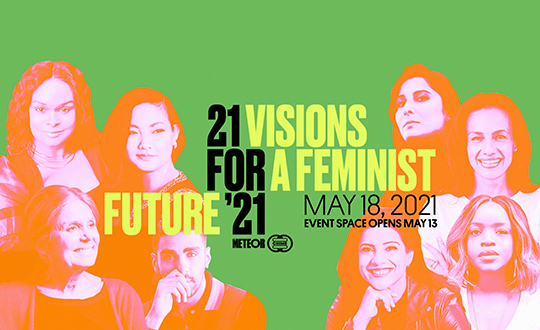
Here’s a preview of just a few of the folks you’ll be in conversation with: “UNDISTRACTED” host and MSNBC contributor Brittany Packnett Cunningham, writer Roxane Gay, advocate for the incarcerated Andrea James, Planned Parenthood CEO Alexis McGill Johnson, visual artist Shantell Martin, Rise founder Amanda Nguyen, Oscar-winning filmmaker Sharmeen Obaid-Chinoy, “Unholier Than Thou” podcast host Phill Picardi, Community Change co-president Lorella Praeli, Girls Who Code and Marshall Plan for Moms founder Reshma Saujani, feminist organizer Gloria Steinem, activist Raquel Willis, and many more. (Stay up to date on the latest developments at 21for21.live.)
Watch films, listen to conversations, and join the discussion about the years to come. The subjects at hand? As wide-ranging as the world we live in, because every issue is a feminist issue. Disability rights, climate, joy—it’s all on the table, and your input will help us shape the agenda.
This free virtual event is open to everyone.
REGISTER NOW >>
21 For ‘21 is a project of The Meteor, and is presented by CHIME FOR CHANGE, Gucci’s global campaign for gender equality.
Oscar nominee Andra Day on protest, power, and Billie Holiday
NEWSLETTER
It’s been over 80 years since Billie Holiday first recorded “Strange Fruit,” about a lynching in the South, and yet in a week that saw multiple Black and brown people killed by police, the song—and the activism that Holiday brought to it—remains painfully relevant today.
Holiday’s legacy was top of mind on UNDISTRACTED, as Brittany Packnett Cunningham sat down with singer, songwriter, and actress Andra Day to talk about her Best Actress Oscar nomination for her role as the jazz icon in “The United States vs. Billie Holiday.”
The Grammy-nominated singer’s stage name is inspired by Holiday—and the film represents her acting debut. Day took home a Golden Globe for her performance, and if she wins the Oscar Sunday night, she’ll be only the second Black woman after Halle Berry to do so.
Packnett Cunningham and Day dug into the role, the history behind “Strange Fruit,” and the need for more stories about “complex” Black women. Just a few highlights:
Day on Billie Holiday’s legacy: “She truly was the great godmother of the reinvigorated civil rights movement…We know about the death of Emmett Till—how it sparked things, but we don’t know that her singing ‘Strange Fruit’ in defiance of the government emboldened a lot of the civil rights leaders that we’re familiar with today. She represents truth to me. She represents freedom fights. She represents conquering your fears. She knew that she would probably be killed every time she got up on stage and sang that song, and she did it anyway.”
Day on Billie Holiday being “complicated”: “I don’t know that she was complicated. I think that the circumstances were complicated. She was complex, the circumstances were complicated. Because the reality is, she was just a Black queer woman trying to live freely in the thirties, forties, and fifties—trying to do what was right.”
Day on what was so threatening about “Strange Fruit”: “We live in a system, a system of oppression—and a system of racial inequality is one that is built on controlling the narrative. So that means deception, lies, misleading, suppressing certain narratives…Truth threatens. The only thing that can dismantle a system built on lies is probably truth. So when you think about it like that, it depends on your agenda. If your agenda is to continue white supremacy, to continue racial inequality; if you’re threatened by the presence of other people living fully and in totality, then yeah, that’s a scary song.”
Packnett Cunningham on the guilty verdict of Derek Chauvin: “Folks will say, you know, ‘Justice was served. The system works.’ But one guilty verdict does not justice make—not when an entire institution is still hunting us. Listen, ‘guilty’ was the only correct call to make, but we can’t be satiated by a single conviction. The point, the entire point, is that the whole system is guilty as hell and it needs to be dismantled in its entirety. If you don’t believe that, look no further than the fact that as the verdict was called out and we were all processing it, Columbus, Ohio police shot and killed a 15-year-old girl.”
Listen on Apple Podcasts, Spotify, Stitcher or wherever you get your podcasts.
WHAT OUR COLLECTIVE IS INTO RIGHT NOW
The Meteor is guided by our collective; here’s what founding member and disability-rights activist Emily Ladau is up to this week.
I’M WATCHING Movies and television shows that make me feel seen. I just watched the documentary Crip Camp for what must be the fifth time, because it’s a chance to celebrate being connected to generations of disabled leaders who came before me and those who continue to fight today. And I also just watched the movie Shiva Baby, which I had a visceral reaction to as a millennial Reform Jewish woman.
I’M READING What Doesn’t Kill You: A Life with Chronic Illness – Lessons from a Body in Revolt by Tessa Miller. Part memoir and part journalism, it’s such a powerful read on navigating relationships—both with yourself and the people in your life—and the broken systems meant to provide care. As a disabled woman, the book deeply resonates, but I think it’s a worthwhile read for anyone, especially those seeking to better understand the experiences of chronically ill loved ones.
I’M FOLLOWING Blair Imani’s YouTube channel. Her “Get Smarter” and “Smarter in Seconds” series are the perfect bite-size social justice lessons.
I’M DOING MORE Journaling. I spend so much time writing for work that I sometimes lose the joy of writing for myself. Putting words on a page that’s meant only for me is a way to reconnect with my love of the writing process.
I’M GETTING MY JOY FROM Being fully vaccinated! And also reminding people that access to the COVID vaccine is a privilege and it shouldn’t have to be. Inequities in distribution continue to abound.
Emily Ladau is a disability-rights activist, writer, and speaker. Editor in Chief of Rooted in Rights and co-host of “The Accessible Stall Podcast,” her writing has appeared in The New York Times and HuffPost. Her book, Demystifying Disability, comes out in September 2021. Subscribe to her newsletter here.
Are the new abortion bans “the last gasp of patriarchy”?
NEWSLETTER
It’s only April, but state lawmakers have already introduced over 500 bills restricting abortion—500!—in 2021 alone. Many of the bills are in the same states that are passing voting rights restrictions and LGBTQ bans—and all these proposals disproportionately affect Black and brown women.
What’s the connection between these various assaults on human rights? Why are they escalating now—and how can we stop them? Those are the questions on the table this week on UNDISTRACTED, as Brittany Packnett Cunningham sat down with Alexis McGill Johnson, president and CEO of Planned Parenthood Federation of America and the Planned Parenthood Action Fund.
Planned Parenthood, which provides health services to 2.4 million people each year, recently released a report showing that restrictions and bans on medication abortion have tripled in 2021 (when compared to the same period in 2019), while anti-abortion constitutional amendments have more than tripled. And there are 17 or 18 cases right now that “are literally one step away from the Supreme Court taking them up,” McGill Johnson says in the episode. “Any one of them could gut Roe.”
Packnett Cunningham and McGill Johnson break down how the right to abortion—popular in most states—became so endangered. This wave of anti-abortion bills may be the “last gasp of patriarchy,” as McGill Johnson says, but that doesn’t make it any less menacing: If Roe is overturned, “25 million women of reproductive age would be impacted.” Highlights and action items from their conversation include:
McGill Johnson on the connection between white supremacy and abortion: “White supremacy is ultimately about reinforcing racial hierarchy and patriarchy and misogyny. And what we are seeing is a group of largely white, male legislators in states where access to abortion is actually popular, but they are using their power to control the bodies of, largely, people of color. They are a hundred percent clear that they don’t even worry about the political impact of making these decisions because they feel that they can get away with it because the impact is largely on people of color.”
McGill Johnson on how abortion rights are human rights: “What upholds white supremacy is dehumanization. That is the strategy, right? Telling people that they are ‘less than’ if they are LGBTQ, ‘less than’ as a member of a BIPOC community; they are not human if they are trans or non-binary. And I think that to me, the first fight is really around restoring that humanity. And that is actually a fight around justice—that is a fight around making those claims on humanity. And then I think that freedom fight is really about restoring the rights ’cause you can’t confer rights, you can’t confer freedom on people that you don’t think are human.”
McGill Johnson on what the future holds for abortion rights in this country: “I keep saying, 2021: We’re in the locker room; it’s halftime. We’re coming out for the next 10 years, because yes, both Congress and our White House, are pro- sexual and reproductive health majorities, and we are working incrementally to issue change—whether that is from Title X to fighting to make sure that we can repeal Hyde.”
Packnett Cunningham on the ability to control your body as one of the most critical expressions of freedom: “There is nothing more important than our ability to have full agency over ourselves—whether or not that’s about ending police violence and state-sanctioned murder, or the ability for people who get pregnant to be able to make their own decisions about their own bodies. It is why, especially as a Black woman of faith, I am unapologetically pro-choice. My ancestors fought too hard and too long for me to be able to control my body.”
Listen on Apple Podcasts, Spotify, Stitcher or wherever you get your podcasts.
The abortion landscape may be “dire,” but there’s also action—and ways we can all get involved. At The Meteor Fund’s recent workshop on reproductive rights and justice, Slate’s Dahlia Lithwick offered her “Yellowstone Park rule” as a starting point. Host of the podcast “Amicus” about law and the Supreme Court, Lithwick argues that the Supreme Court is influenced by public opinion so it’s critical to stay loud on issues.
“Being visible is the single most important thing we can do,” Lithwick said. “This is the Yellowstone Park rule: You have to be bigger than the bear. You have to be massive when you come across a bear. My experience [suggests this] is the reason the Supreme Court right now is not taking one of these completely bonkers voting-rights cases is because they see us.”
The panelists got into everything from the coming wave of laws affecting young people’s rights to Justice Amy Coney Barrett’s take on fertility treatments. You can read the key learnings in The Meteor Fund’s wrap-up.
Amber Ruffin on what’s so funny about racism
NEWSLETTER
Need a laugh after the week we just had? (Or, perhaps, the year?) So did we, so for the latest episode of UNDISTRACTED, Brittany Packnett Cunningham sat down with Amber Ruffin to talk about the TV host’s brilliant blend of social justice commentary and comedy.
Ruffin is the star of “The Amber Ruffin Show” and a writer and performer on “Late Night With Seth Meyers.” She also just wrote a bestselling book with her sister Lacey Lamar: You’ll Never Believe What Happened to Lacey: Crazy Stories about Racism, which Ruffin describes as “a very good time about very bad stuff.”
As you might expect, it’s a fairly hilarious episode. Highlights include:
Ruffin on what’s so funny about racism: “On the surface, nothing. In practice—everything. I mean, the very definition of it is ridiculous. You know, it’s like these people who walk among us are walking around with these insane beliefs and when they come into play, it is funny. I think when it happens to you, it’s almost always either funny or infuriating and lots of times, it’s really funny. When someone mentions a rap song and then they look at me like, You know what I mean? I am 42. I don’t know what rap song you’re talking about!”
Ruffin on why “all Black women should be writing on a late night show:” “It’s exactly what we are good at. You take this ball and you take it all the way to the finish line. Like you write your idea and then you have to find a funny wig and you have to dress up like a dinosaur and you have to make sure that it’s edited in the right way. And you have to turn it in on time. You know what I mean? You know how all Black women are just natural event planners and we’ll check and see like, ‘I know you said you’d do it, but did you get it done?’—like that. Those people are the best at late night.”
Ruffin on what it’s been like to mine humor in the wake of 2020: “My goal has always been to de-gaslight us…I just wanted everyone to have an adult in their lives that will call garbage garbage.”
Ruffin on telling it like it is when it comes to racism: “The only way to talk about it is to go right through it. And also, talking in circles around it is how we got here in the first place. I don’t think there can be any more shorthand. There can’t be any more tip-toeing—we have to call it what it is and let it sting.”
Action item for all of us: In the first three months of 2021, there have been 104 mass shootings—a number that doesn’t include continued gun violence in Black, brown and marginalized communities. “I don’t know what it’s going to take for enough to be enough, but I do know one thing: Thoughts and prayers are nice, but action is better,” Packnett Cunningham said on this week’s episode. “So to Congress—we’re going to make sure you do your jobs.” Visit March for Our Lives, which supports communities that are most impacted by gun violence, to learn more.
Listen on Apple Podcasts, Spotify, Stitcher or wherever you get your podcasts.
WHAT OUR COLLECTIVE IS INTO RIGHT NOW
The Meteor is guided by our collective; here’s what founding member and publishing executive Madhulika Sikka is up to this week.
Hello, I’m Madhulika Sikka and this is what’s up with me right now. Time has been doing that thing it does of moving incredibly fast, but also painfully slowly. How are we in year two of this pandemic?
I’M LISTENING TO myself. I’ll do the things I want to do when I want to. One of the biggest pressures on me had been, well, me. I realized I had control over that.
I’M GETTING MY JOY FROM cooking. I like to cook and working from home means I can cook with a little more thought and intention and time management. I’m expanding my repertoire which means more good food! And yes, I became that sourdough person too.
I’M WATCHING Giving myself a break. When Covid-19 hit, I was determined to be as productive as possible, even if I was home—nearly a year in, I’ve thrown that bullshit out the window. We’re all doing our best, there’s no reason to make life even harder by telling myself that I need to work even more.
I’M READING Homeland Elegies by Ayad Akhtar. This author and Pulitzer prize-winning playwright is one of the most dazzling American artists of the last decade. This mind blowing piece of auto-fiction is a rollicking narrative that addresses the unthreading of America in the post 9/11 world.
I’M DOING LESS OF doomscrolling on social media. I highly recommend it.
Madhulika Sikka is is a media executive with experience across video, audio and digital. The VP and executive editor of Crown Publishing and former executive producer of audio at The Washington Post, she is also the author of A Breast Cancer Alphabet.
Lisa Ling on the movement to stop anti-Asian violence
NEWSLETTER
You’ve heard the stats: Anti-Asian hate crimes are up, more than doubling over the course of the last year. And you may have seen the disturbing videos, since so many of the violent attacks have been captured on film.
How did we get here? And how can we create a safer future for Asian Americans? This week on UNDISTRACTED, Brittany Packnett Cunningham sits down with journalist and CNN host Lisa Ling to discuss the current wave of bias and the movement that’s building to fight it.
Award-winning journalist Ling is the host and executive producer of the CNN docuseries “This is Life with Lisa Ling,” which explores stories from communities across the country.
Packnett Cunningham and Ling dig into the rising trend of anti-Asian violence, its little-taught history, the problem with the “model minority” view of Asians and how we can all take action against anti-Asian racism. Highlights include:
Ling on Trump’s role in the rise of anti-Asian hate crimes: “Do I think that Trump’s rhetoric had something to do with the increase in attacks? I mean, how could it not? Covid-19 has a bonafide name and for, arguably the leader of the free world, to not only refer to this virus as the “China virus” or the “Kung Flu” or the “Wuhan virus;” whenever he said it, he said it with such contempt, at a time when life in this country has been entirely upended, hundreds of thousands of people have become infected and died of this virus. It’s hard not to see how there could be a correlation. The contempt that he expressed whenever he talked about it—to me was inciting in and of itself.”
Ling on the harm of “model minority” myth—the idea that Asian American and Pacific Islanders are a monolithic group of “well-behaved” immigrants: “The ‘model minority’ myth, which is exactly that—it’s a myth—was used to pit minority communities against each other. Look! Asian Americans: they are hardworking. They are such achievers. Why can’t all minorities be like them? This period that we’re experiencing right now is a real reckoning. It’s a moment of inflection when we have to really look back and look at the reality that so many Asians are experiencing. We are not a monolith. We are comprised of so many different ethnicities. We come from so many rich cultures and our struggles and our triumphs have been entirely different. And until we recognize that, that stereotype or that categorization of the ‘model minority’ will continue to inflict and foment a lot of really adverse reactions with regard to the Asian community.”
Ling on how ordinary people can fight anti-Asian bias: “What I will say to people who are listening, ordinary citizens who are as disturbed as I am about what’s happening: If you see an Asian grandparent walking down the street alone, and you have a little bit of time, if you would maybe walk alongside him or her just to show some support and solidarity with that person. I think that would go a long way. Recognize that they are part of your community–they’re not outsiders. And don’t scapegoat them for something that they had absolutely nothing to do with. If you do see violence happening, speak out, stand with us, stand against racism and let’s show the world that we can do better—that we can stand up for each other irrespective of the color of our skin.”
Brittany’s book recs for further reading: “We are doomed to repeat the history we don’t know, so let’s get busy learning it,” Packnett Cunningham says on this week’s episode. To keep learning, she recommends the graphic novel American Born Chinese by Gene Luen Yang and The Making of Asian America by Erika Lee.
Listen on Apple Podcasts, Spotify, Stitcher or wherever you get your podcasts.
Congress recently introduced the Black Maternal Health Momnibus Act of 2021 to address the appalling rates of maternal mortality in the U.S. Almost 60% of maternal deaths occur in the first year after delivery—and the majority of these deaths are preventable, as Breana Lipscomb from the Center for Reproductive Rights pointed out at The Meteor Fund’s recent workshop, noting that Black, Indigenous and low-income moms are most at risk. Read highlights from the workshop and learn about ways to help in our wrap-up.
